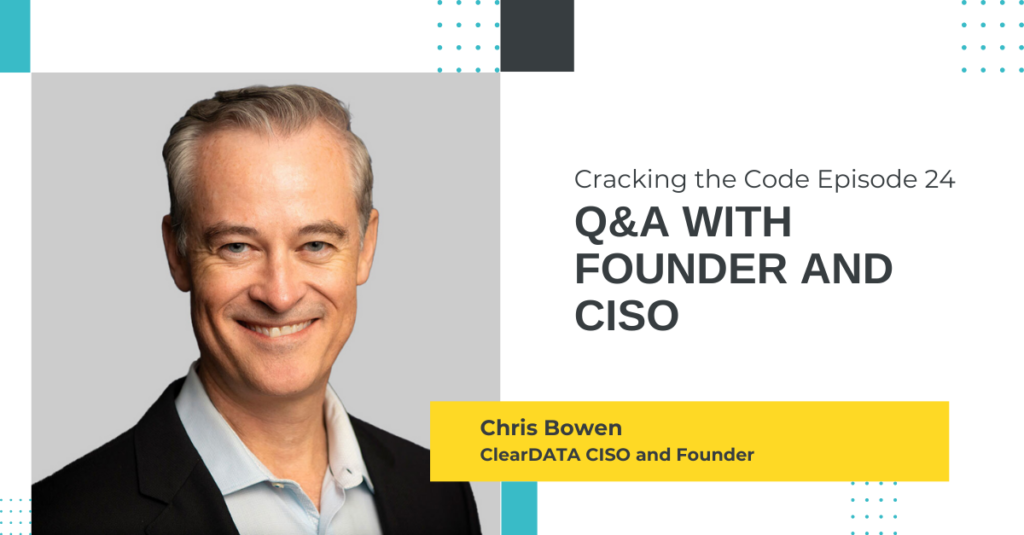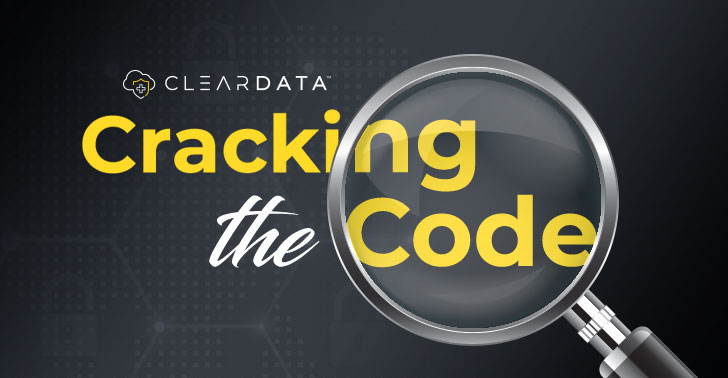Unlock Expert Insights: HLTH 2024 Takeaways
On the latest episode of Cracking the Code, Chris Bowen, CISO and Founder, Nico Severino, Chief Revenue Officer, and John Dering, SVP of Marketing, sit down to discuss the recent HLTH 2024 Conference in Las Vegas and key takeaways for the future of healthcare cybersecurity.
The Intersection of AI and Healthcare Innovation
AI in healthcare continues to be a a game-changer, offering new ways to improve patient outcomes and streamline operations. Chris, John, and Nico from ClearDATA emphasized how AI-driven technologies are revolutionizing areas like remote patient monitoring and smart hospitals. These innovations are not only enhancing patient care but are also paving the way for a more connected healthcare ecosystem. As AI continues to integrate into healthcare, Bowen emphasized it is crucial to maintain a balance between technological advancement and patient privacy.
Cybersecurity Trends: Protecting Healthcare Data
With the rise of AI in healthcare comes the increased risk of cyber threats. The discussion highlighted how cybersecurity trends are evolving to address these challenges. Data protection strategies have become a focal point for healthcare organizations, especially with the growing amount of patient data being handled digitally. The leaders stressed the importance of implementing comprehensive cybersecurity measures to safeguard sensitive information and maintain trust in digital healthcare solutions.
Data Protection Strategies: Navigating New Regulations
Data protection in healthcare is under intense scrutiny, particularly with new regulations emerging globally. The conversation explored how healthcare providers are adapting data protection strategies to comply with stringent laws like GDPR, HIPAA, HITRUST and new state-specific regulations. Understanding and implementing these strategies is vital for healthcare organizations to avoid data breaches and ensure compliance, thus protecting both their operations and their patients.
We invite you to join the conversation: How do you see healthcare data protection changing in the future? What strategies are you implementing to maintain trust and security in your digital healthcare solutions in the cloud?
FAQ
What are the benefits of AI in healthcare?
AI in healthcare offers several advantages, including improved patient outcomes, enhanced operational efficiency, and the creation of a more connected healthcare ecosystem. AI-driven technologies, such as remote patient monitoring and smart hospitals, are revolutionizing the way healthcare is delivered by providing real-time data and predictive analytics.
How is cybersecurity evolving in healthcare?
Cybersecurity in healthcare is evolving to address the growing threats associated with digital data. Healthcare organizations are increasingly focusing on comprehensive cybersecurity measures to protect sensitive patient information. This includes implementing advanced data protection strategies and staying abreast of cybersecurity trends to mitigate risks and maintain trust in digital solutions.
Why is balancing AI innovation and patient privacy important?
Balancing AI innovation with patient privacy is crucial to ensure that technological advancements do not compromise sensitive personal data. As AI becomes more integrated into healthcare, it is essential to maintain robust data protection measures to protect patient information while still reaping the benefits of AI-driven healthcare solutions.
How can healthcare organizations prepare for new data protection regulations?
Healthcare organizations can prepare for new data protection regulations by staying informed about legal requirements, investing in compliance training, and deploying technologies that ensure data security. Regularly reviewing and updating data protection policies can also help organizations remain compliant and protect sensitive information effectively.


